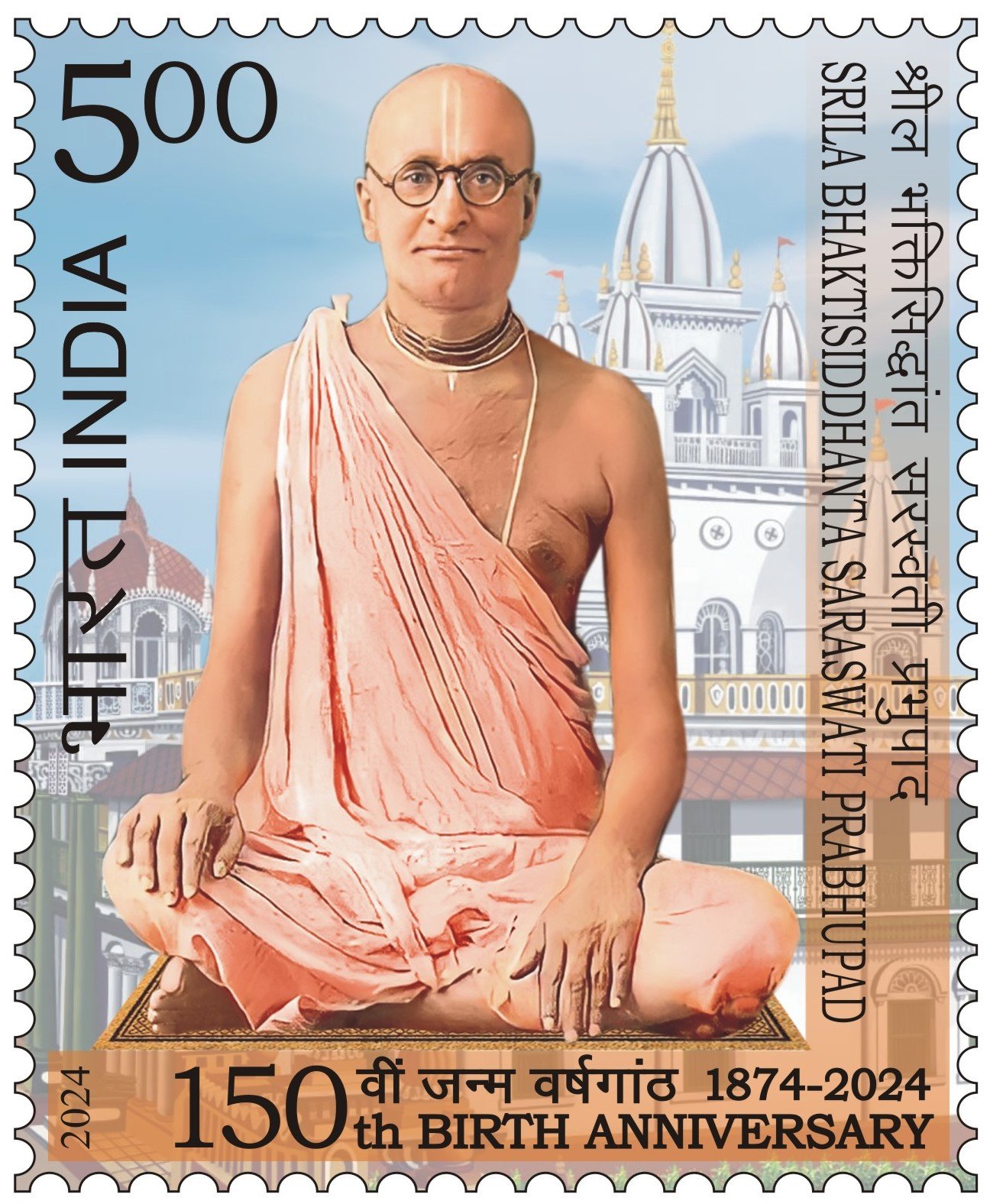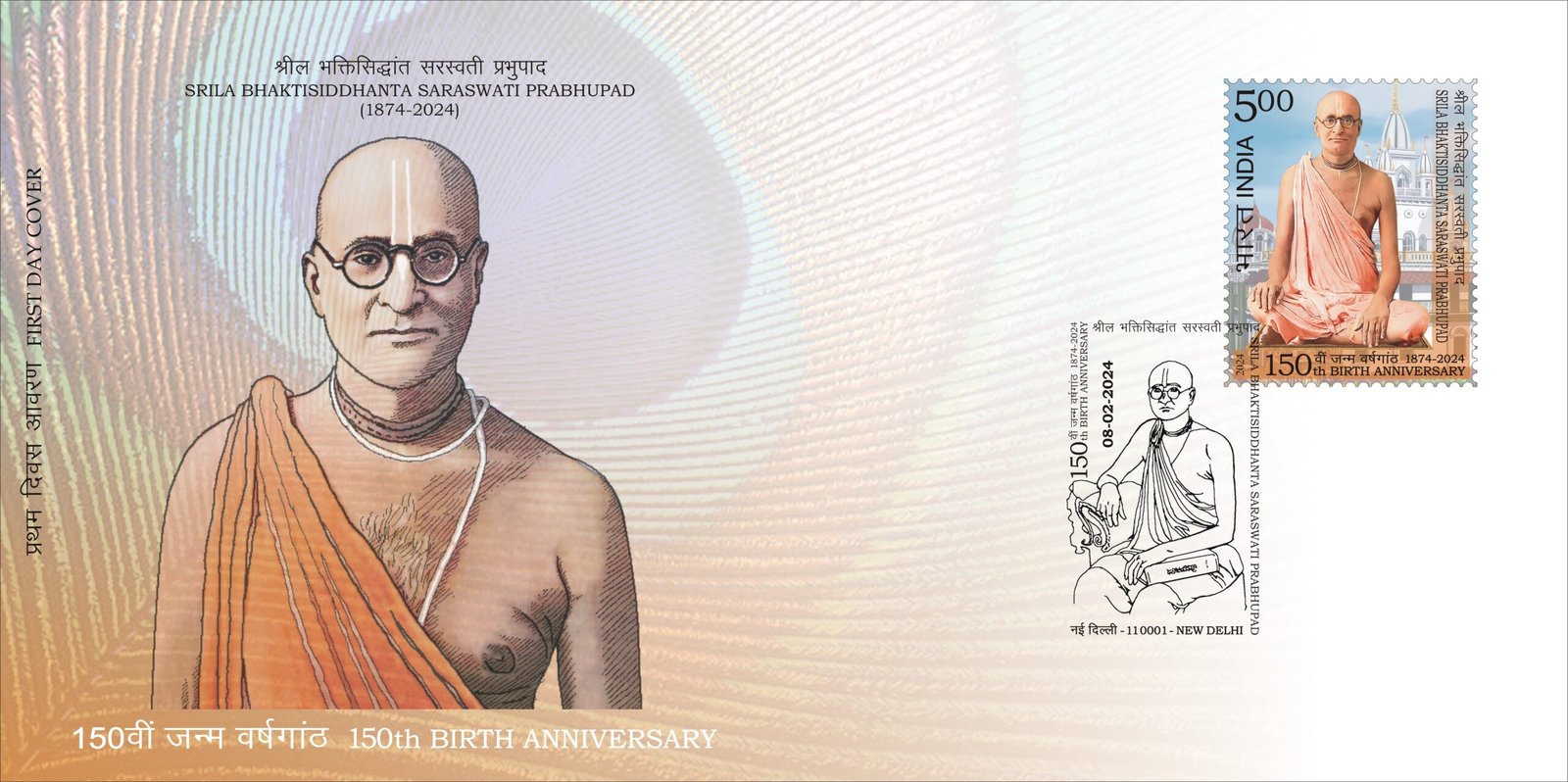150th Birth Anniversary of Srila Bhakti siddhanta Saraswati Prabhupad

Technical Data
| Date of Issue | February 8, 2024 |
|---|---|
| Denomination | Rs. 5 |
| Quantity | 201,600 |
| Perforation | 13 x 13¼ |
| Printer | Security Printing Press, Hyderabad |
| Printing Process | Wet Offset |
| Watermark | No Watermark |
| Colors | Multicolor |
| Credit (Designed By) | Mr. Suresh Kumar |
| Catalog Codes |
Colnect codes IN 2024.02.08-01 Michel IN 3983 Yvert et Tellier IN 3625 Stanley Gibbons IN 3897 |
| Themes | Anniversaries and Jubilees | Famous people | Men | Philosophers |
Honouring a Spiritual Luminary
Born on 6th February 1874 in Puri, Srila Bhaktisiddhanta Saraswati Goswami Prabhupad emerged as one of the most influential spiritual leaders of modern India. The seventh child of Sri Kedarnath Dutta (later known as Srila Bhakti-Vinode Thakur) and Bhagwati Devi, he was given the birth name Bimala Prasad. Over his lifetime, he was known by various names, including Siddhanta Saraswati which he often used as his signature and Sri Varshabhanavi-Dayita-Das, as referenced in Sanskrit texts. Today, the Gaudiya Vaishnava Sampradaya reveres him simply as Srila Prabhupad.
Early Life and Education
From childhood, Bimala Prasad exhibited remarkable spiritual and intellectual abilities. At the age of nine, he memorized 700 verses of the Bhagavad Gita in Sanskrit. He began his formal education at an English school in Ranaghat, Nadia district, while also cultivating spiritual practices under the guidance of his father. In 1880, he was initiated into Harinama-japa, a meditative chanting of the Hare Krishna mantra on Tulsi beads a cornerstone of Gaudiya Vaishnava practice.
Bimala Prasad pursued higher studies at Calcutta Metropolitan Institution (Vidyasagar College), excelling in Sanskrit, mathematics, and Jyotisha (traditional Indian astronomy). Recognizing his scholarly brilliance, his tutors conferred upon him the honorary title Siddhanta Saraswati, which he adopted as his pen name. He furthered his education at Sanskrit College, delving into Indian philosophy and ancient history.
Spiritual Journey and Reform
In January 1901, he accepted Gour Kishore Das Babaji as his spiritual master and was named Varsha Bhanavi-devi-Daita Dasa. Following the passing of his father and Guru, he embraced Sanyas, becoming Bhaktisiddhanta Saraswati Goswami, and embarked on pilgrimages across India.
Witnessing widespread religious dogma and corrupt practices, Srila Prabhupad became a spiritual reformer, reviving the tenets of Vaishnavism, the religion of devotion and universal brotherhood propagated by Sri Chaitanya Mahaprabhu. In 1918, he established the Gaudiya Math, paralleling the reformist efforts of Swami Vivekananda with the Ramakrishna Mission, to propagate spiritual knowledge across India and the world.
Contributions to Global Spiritual Awareness
Srila Prabhupad’s vision extended beyond India. He published spiritual magazines and newspapers in multiple languages, including:
- Sajjan Toshini/Harmonist and Gaudiya (Bengali)
- Bhagbat (Hindi)
- Kirtan (Assamese)
- Paramarthi (Oriya)
He established printing presses to disseminate these works and other Vaishnava texts. Envoys were sent to London and Europe, and in 1933, the English book Shri Krishna Chaitanya was released to introduce Sri Chaitanya Mahaprabhu’s devotional teachings to Western audiences. He also organized exhibitions combining Bhagavat themes, agriculture, and industry to educate and inspire communities across India.
Education and Social Reform
In 1935, Srila Prabhupad founded Para Vidya Peeth at Gaudiya Mission Bagbazar, emphasizing self-realization and universal love. He also established educational and research institutions, including:
- Thakur Bhakti Vinode Institute (residential high school)
- Thakur Bhakti Vinode Research Institute (advanced studies in Gaudiya Vaishnav literature)
He actively opposed caste restrictions in religious life, promoted universal access to Vishnu temples, and worked to eradicate orthodox dogma, superstitions, and sectarian divides.
Legacy and Influence
Srila Prabhupad’s profound scholarship, literary works, and missionary zeal inspired both spiritual seekers and notable personalities, including Netaji Subhas Chandra Bose, Dr. Shyama Prasad Mukherjee, Maharaja Manikya Bahadur, Sri Madan Mohan Malviya, and Raja Gopalachari.
On 1st January 1937, he departed from the world, leaving a rich legacy of devotional practice and spiritual education based on the ancient Vedic scriptures.
Commemorative Postage Stamp
To celebrate his 150th birth anniversary, the Department of Posts is honored to issue a commemorative postage stamp dedicated to Srila Bhaktisiddhanta Saraswati Prabhupad. This stamp pays tribute to his lifelong contributions to the spiritual upliftment of millions in India and abroad and immortalizes his teachings on devotion, universal brotherhood, and non-violence for philatelists and admirers worldwide.
First Day Cover

